Hanging kitchen units on stud walls
Hanging kitchen units on stud walls offers a small problem when fitting a kitchen as you need to ensure that you adequately support the weight of the wall units. Yes, you have the vertical studs, but the chances of them coinciding with the required unit fixing points is pretty small, and simply relying on hollow wall fixings for the areas in between studs, really is not an option. The following sequence shows a technique that will ensure you get strong fixing points, and whilst it is a little messy, it is by far the best way of hanging kitchen units on stud walls.
| 1. Mark on the wall surface, the exact height of where the wall unit fixing brackets need to be positioned. Draw a line to mark this fixing height along the extent of your unit run. | 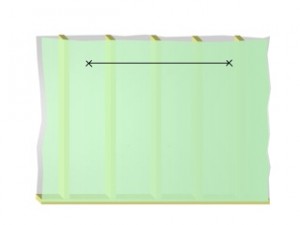 |
| 2. Cut out a section of plasterboard from the stud wall, as shown. You need to ensure you allow yourself enough access to fix in some extra noggins, and in most cases you’ll need to extend past the end of your fixing line, up to the ‘next’ vertical stud. Take care not to cut into cables or pipes, that may be concealed in the wall. | 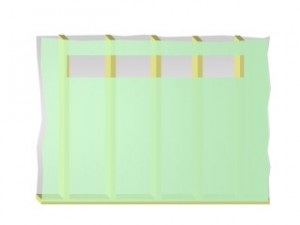 |
| 3. Cut noggins to the required width and fix them along the ‘fixing line’. 100mm x 50mm (4in x 2in), or similar, timber is ideal for this. | 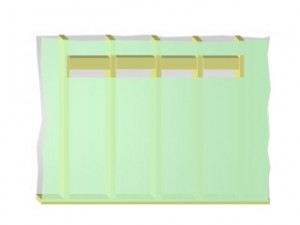 |
| 4. Cut some plasterboard to size and fix it to the studs with some drywall screws. You must then apply some scrim tape (self-adhesive is easiest) along the joints to help prevent any cracking after the plaster has been applied. | 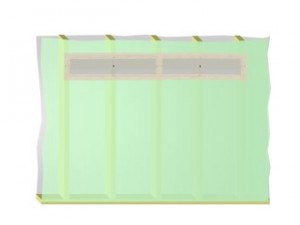 |
| 5. Skim the area with some plaster. You can use standard Multifinish plaster for this, or you can buy a small bag of patching plaster if more convenient. | 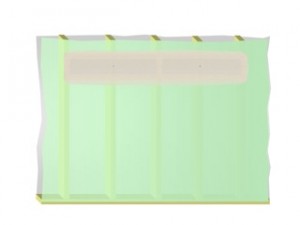 |
| 6. Once the plaster is dry, sand smooth. If you’re plastering is not great, keep filling and sanding the area until you get a good flat finish. Bear in mind that most of this area will be behind wall units, so it doesn’t need to be perfect, but you should avoid too much unevenness, as you want the units to sit ‘flat’ against the wall surface. Also, it’s worth giving the area a coat of your chosen paint before fitting the units. | 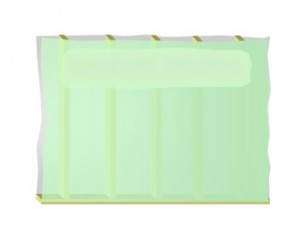 |
| 7. Re-mark the fixing line and you can now go ahead and hang the units, knowing that you have secure fixing points. For more on hanging wall units, see my guide – ‘Fitting kitchen wall units’. | 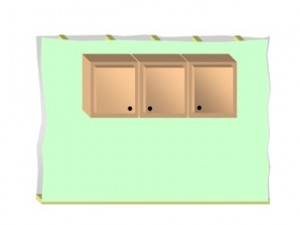 |
Things to consider when hanging kitchen units on stud walls
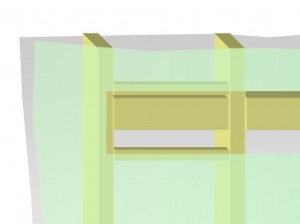 The best technique, and further tips for cutting out plasterboard sections is shown in my guide –‘Filling large holes in hollow walls’.
The best technique, and further tips for cutting out plasterboard sections is shown in my guide –‘Filling large holes in hollow walls’.- In the example shown, you may want to add one or two further bits of support at each end of the fixing line, not for the units, but for the plasterboard. Scrim will help any cracking possibilities to an extent, and areas behind the unit, need not be a concern, but in those areas of your ‘patch’ that will be seen, adding some support to the plasterboard edges is a true ‘belt and braces’ option. In our example, a couple of timber battens as shown in the diagram to the right, is all that is needed.
- Some large units may have a further fixing rail nearer the lower edge of the unit. In which case, you will need to open your wall up a little more, to add further noggins. Effectively, this isn’t actually much more work, but it will cost a little more in materials, to make good.
- Make sure that the plasterboard you use for patching, is the same thickness, or less, than that of the original on the stud wall. In other words, if the plasterboard is too thin, you can still build up plaster layers to get it level with the original, but too thick and you’ve got big problems!
- This is not the only way to solve the stud wall problem with kitchen units, as you’ll find many an experienced kitchen fitter using rails, brackets, assorted special fixings, and general combinations of these options, in order to avoid actually cutting into the wall. The key here, is that they are experienced, and have seen most of the many scenarios that can present themselves in these situations. Therefore, I’d advise you go with the option I’ve demonstrated here, as it is by far the most certain, and safe, way of successfully hanging kitchen units on stud walls.

Help !
I have a wall – plasterboard – behind which there is nothing ! 7-8 inches back i hit a metal structure – how can i hang a heavy curtain on this ? it seems to be the lenght of the top of the window. I did use plasterboard plugs etc but they didnt work.
Hi Pat,
Without knowing the exact wall structure, it’s a little tricky to help, but here are a few thoughts. It sounds like the metal structure may be the lintel, but whether it is or not it’s certainly what you don’t want to be fixing to (could be pipework etc. so proceed with caution!). Instead you could consider mounting your curtain track or pole on a length of batten. The advantage of this is that you may be able to locate upright wooden studs (as it sounds like you’re in a timber framed house) to securely attach the batten, and then you can definitely support the weight of a heavy curtain. Even if you can’t locate studs, if you use hollow wall fixings to fix the batten, this should be pretty secure and spread the weight of your heavy curtain. There’s more info. and links on this in my guide ‘Fitting curtain tracks’. Hope this helps.
Best,
Julian